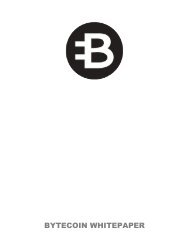Whitepaper - Factom With Cover
You also want an ePaper? Increase the reach of your titles
YUMPU automatically turns print PDFs into web optimized ePapers that Google loves.
Appendix 5: Proof of Stake Similarities<br />
<strong>Factom</strong> Consensus Similarities and Differences from Proof of Stake<br />
The policy and reward mechanism in <strong>Factom</strong> is similar to Proof of Stake (PoS). <strong>Factom</strong> differs<br />
from most PoS systems in that only a subset of users' stake is recognized. Only value which<br />
has been committed to the system has a voting share. The transferable Factoid value does not<br />
have a voting share. Only value which has been turned into Entry Credits, which is not<br />
transferable, has a say in choosing the Federated servers. This is an attempt to make the<br />
servers answerable to the users actively using the service, instead of users with mere potential<br />
to use the service. The individual users would delegate their votes to a server. The Federated<br />
servers with the top numbers of votes would be responsible for coming to consensus.<br />
Some with a deep understand of Bitcoin have recognized that pure PoS consensus<br />
mechanisms are fundamentally flawed. There are two attacks that make pure PoS unworkable.<br />
The problems are referred to as "Stake Grinding" and "Nothing at Stake". Although <strong>Factom</strong> has<br />
PoS elements, it does not suffer from these problems.<br />
Stake Grinding<br />
Stake Grinding is a problem where an attacker with a sizable (say 10%), but not majority share<br />
can formulate false histories. From some point in history, they can costlessly fork the<br />
blockchain, choosing to reorder past transactions such that their stake is always selected to<br />
create the subsequent blocks. They would be able to present this alternate version of history as<br />
part of an attack to steal value by double spending. Bitcoin solves this problem by strongly<br />
linking the information domain, where computers make decisions, with the thermodynamic<br />
domain, where humans burn energy. Considerable resources are expended in the<br />
thermodynamic domain, and is provable in the information domain. Bitcoin makes forming false<br />
histories hugely expensive.<br />
<strong>Factom</strong> is unable to create alternate histories after the fact, since it is unable to insert<br />
transactions into historical Bitcoin blocks. It is also unable to create parallel histories without<br />
being detected, since <strong>Factom</strong> is linked to Bitcoin with known Bitcoin private keys.<br />
Nothing at Stake<br />
The Nothing at Stake problem is more subtle. <strong>With</strong> a policy disagreement in Bitcoin, miners<br />
must choose either one policy or the other. If they choose against the majority, they will be<br />
burning lots of electricity without a chance of recouping costs. PoS miners do not face this<br />
dilemma. They can hedge their bets and costlessly create forks complying with each side of the<br />
policy. They would simultaneously agree with both sides of the disagreement. This would open<br />
up the economy to double spend attacks. One of two merchants following different forks will<br />
ultimately have that money becomes worthless.<br />
37
















